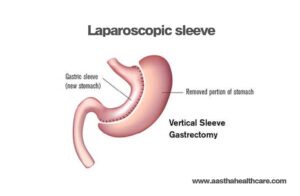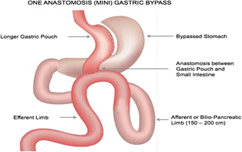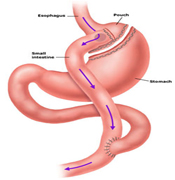Types of Bariatric Surgery for Weight Loss - Aastha Bariatrics
Table of Contents
With growing technology today, people have many opinions for weight loss. However being able to understand the right treatment is still a task. Let us talk about what should be done if you are looking forward to reduce those extra kilos your body is carrying past so many years.
Many people don’t even know if they are overweight or obese. Let me first tell you how to know if you are overweight or obese. This can be figured out by first checking your BMI.
What is BMI?
BMI is Body Mass Index, it is a person’s weight in kilograms divided by the square of height in meters. BMI is an inexpensive and easy screening method for weight category—underweight, healthy weight (normal), overweight, and obesity. It appears to be as strongly correlated with various metabolic and disease outcome as are these more direct measures of body fatness.
Measure your BMI-
Nutritional Status | Asian Criteria |
Normal | <25 |
Overweight | 25 – 29.9 |
Obese I | 30 – 34.9 |
Obese II (Morbid obesity) | 35 – 39.9 |
Obese III (Super obesity) | 40 and above |
If your BMI is greater than 35 with co-morbidities, meaning other health issues like heart diseases, diabetes, sleep apnea etc. you are eligible for weight loss surgery or Bariatric surgery. If your BMI is greater than 40 only Bariatric surgery can help you lose weight.
Bariatric Surgery Means?
Different types of surgeries undertaken for weight loss purposes are collectively known as Bariatric Surgery. In simple words, Bariatric Surgery reduces the size of the stomach which in turn reduces the hunger hormone Ghrelin and the appetite of the patient is reduced. A surgeon Doctor and his team of Dieticians undertake a certain medical assessment and then suggest to the patient the type of Bariatric Surgery required. After Bariatric Surgery, a patient needs to undertake a healthy lifestyle and healthy eating habits in order to lose weight and keep the healthy weight maintained.
Types of Bariatric surgery-
There are 3 main types of surgeries- Laparoscopic Sleeve Gastrectomy, Mini Gastric Bypass, Gastric Bypass Surgery. Laparoscopic Surgery is much safer. Laparoscope a small thin tube having camera fitted at the tip used and four small incisions are made.
Laparoscopic Sleeve Gastrectomy-
Laparoscopic Sleeve Gastrectomy is a restrictive procedure without the malabsorptive component present in other bariatric procedures. It involves resection of two-thirds of the stomach to provide increased satiety and decreased appetite. The surgeon will make about five small cuts in your belly. He or she will do the surgery using a thin, long, telescope with a tiny camera at the end. Instruments pushed through the incisions will be used to remove the extra stomach which was not yours at the time of birth. Your surgeon will do the procedure using images on a TV screen in the operating room.

Mini Gastric Bypass Surgery-
The surgery is initiated by reducing the size of the stomach so that it requires less food. The stomach is converted into a long slender pouch up to the antral part by stapling.

The second step of the surgery involves the creation of a bypass for food to flow from the new stomach pouch. A loop of small intestine is chosen depending upon the surgeon and the metabolic condition of the patient. The middle section of intestine is attached to the opening in the stomach pouch creating what is referred to as the “omega loop”. The loop enables food to bypass the lower stomach, duodenum, and a portion of the small intestine. At the end of the procedure, the incisions are closed with sutures.
Gastric Bypass Surgery-
Gastric bypass is also called Roux-en-Y gastric bypass. It is a type of weight-loss surgery that involves creating a small pouch from the stomach and connecting the newly created pouch directly to the small intestine. After gastric bypass, swallowed food will go into this small pouch of stomach and then directly into the small intestine, thereby bypassing most of your stomach and the first section of your small intestine.

Gastric bypass is one of the most commonly performed types of bariatric surgery. Gastric bypass is done when diet and exercise haven’t worked or when you have serious health problems because of your weight.
By 2030, 27% obese patients will be from India across the globe. It is high time that we start taking obesity as a serious health problem and treat it scientifically.
Medically reviewed by Dr. Manish Motwani, Bariatric & Metabolic Laparoscopic Bariatric Surgeon — Written by Ruchika










